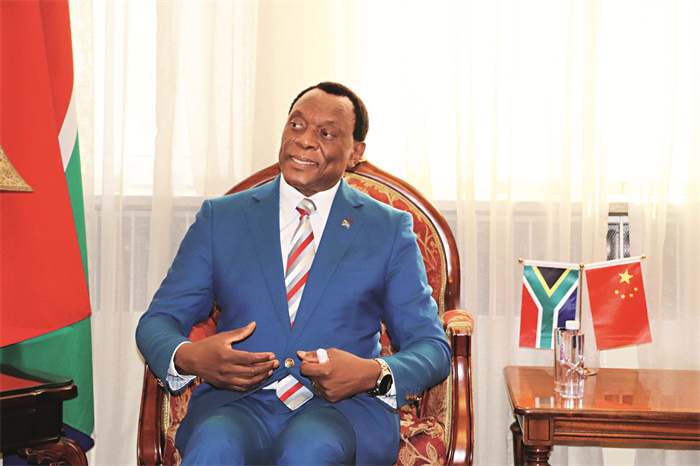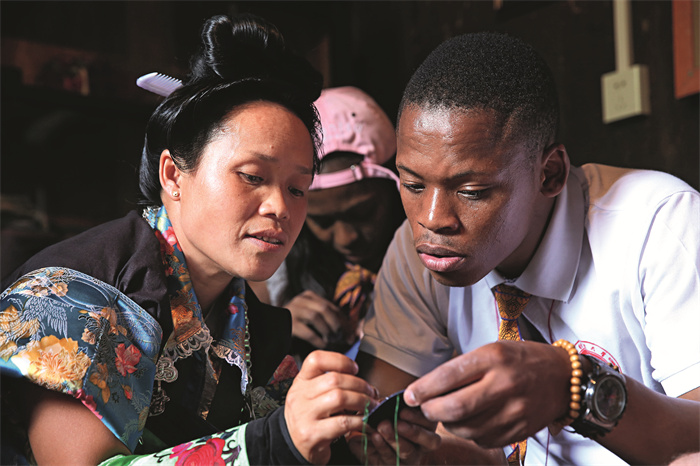|
||||||||||
| Home Nation World Business Opinion Lifestyle ChinAfrica Multimedia Columnists Documents Special Reports |
|
||||||||||
| Home Nation World Business Opinion Lifestyle ChinAfrica Multimedia Columnists Documents Special Reports |
| ChinAfrica |
| Bonds of Friendship |
| Mutual trust and benefits mark 25 years of China-South Africa ties |
| By Xia Yuanyuan and DONATIEN NIYONZIMA 丨VOL. 15 January 2023 ·2023-01-03 |

South African Ambassador to China Siyabonga Cyprian Cwele (XIA YUANYUAN)
The year 2023 marks the 25th anniversary of the establishment of diplomatic relations between China and South Africa. The two countries have witnessed increasingly closer relations and fruitful cooperation since the establishment of their diplomatic relations in 1998, and have increased their cooperation on international issues through such platforms as the UN, the BRICS mechanism, the G20, and the Forum on China-Africa Cooperation (FOCAC). On this important occasion, ChinAfrica interviewed Siyabonga Cyprian Cwele, South African ambassador to China, to hear his views on the development of China-South Africa relations. Edited excerpts of the interview follow:
ChinAfrica: What highlights stand out for you in the past 25 years of China-South Africa relations?
Siyabonga Cyprian Cwele: China-South Africa relationship has been growing strong over the years. As you know, we started these formal bilateral relations in 1998 after a long period of colonialism.
We elevated the relationship from strategic partnership to comprehensive strategic partnership in 2012, and from there, activities increased dramatically. At the political level, the relationship is working very well. It is important to maintain good political relations because they set the foundation for the economic and people-to-people exchanges. We have signed a 10-year strategic plan that will guide us until 2029.
There are high-level dialogues that give guidance to our diplomats on the way to strengthen the relations and it makes it easy for us to interact with the Chinese counterparts. We have also deepened party-to-party relations. The closeness of the relations at the party level translates to relations at the government level. From next year, I’m quite confident that we’ll have more state visits between our two countries. There are many international platforms where we cooperate and strengthen the relationship between our two countries. It’s getting stronger and stronger.
We are planning to make the 25th anniversary a memorable event. We have started to engage with some Chinese entities and cultural entities so that we make the plans for this important milestone.
China has been South Africa’s largest trading partner for 13 consecutive years since 2009, and South Africa has been China’s largest trading partner in Africa for 12 consecutive years. What are the prospects of economic and trade cooperation between China and South Africa?
Like you said, China is the largest trading partner of South Africa since 2009 and South Africa has been the largest trading partner of China in Africa since 2010, which is also linked to the elevation of the relationship to comprehensive strategic partnership. Even during the height of COVID-19 pandemic, our economic relations, trade and investment continued to increase.
What is the reason for that? It’s because of South Africa’s stability - the country has capable workforce, modern infrastructure, and one of the best financial systems. Our economy is well integrated now with Africa and the world. There are so many things that attract more investors.
More and more Chinese big corporations are investing in South Africa. And what is good about the Chinese companies is that they are coming not only with better financial resources, but also with more modern technology. Their investment is yielding positive results with new technologies.
Our recovery plan prioritises certain sectors which we are now encouraging the Chinese investors to consider. These include agriculture and agro-processing. We are focusing on infrastructure. We are really looking at partnering to modernise our manufacturing and encouraging more cooperation in technology and energy.
In 2023, China will mark the 10th anniversary of the Belt and Road Initiative (BRI). What’s your perspective on the BRI? How does the BRI benefit local people?
South Africa was among the first countries in Africa to join the BRI. In 2015, projects worth 43 billion dollars were signed in South Africa; that’s significant. There are projects in different stages of development, for example the small harbour cooperation that will benefit the small fishermen, and tourism. The cooperation also includes major road and rail projects, but those are huge infrastructure projects which need a lot of planning. Let me just use a good example. We now need a high-speed railway between Johannesburg and Durban.
We’re working with the Chinese to create infrastructure to connect the country to the neighbours. It’s well appreciated. And now we want to align the BRI with our national development plan. The BRI should also be aligned with the AU’s Agenda 2063, which is the development plan for the whole continent. What is good with China’s infrastructure assistance is that they create infrastructure to connect the cities (of a country) and then connect to your neighbours, because that’s what the African continent free trade requires. You can’t be trading with peoples in Europe when you can’t even trade easily with your neighbours.

A student from the Cape Peninsula University of Technology in South Africa learns embroidery skills from a Miao ethnic embroiderer in Guizhou Province on 22 July 2017
There is a discussion about a possible expansion of BRICS, with many countries expressing readiness to join the group. How do you view a “BRICS Plus” mechanism, and how will it affect emerging economies, especially those in Africa?
Our first BRICS summit in South Africa was in 2013, after being admitted in 2011. And during that summit, we pushed very hard with our BRICS partners as they didn’t understand our outreach programme. We said it’s the first time we have a BRICS meeting in Africa, and let’s have our summit. But after that, let’s have just maybe a few hours with leaders representing regions of Africa and hear from them what challenges they are facing as developing countries. Other BRICS partners accepted this concept.
So, it’s not the first time we are facing this opportunity of expansion. Our leaders have been discussing these over years. We believe that because Africa has good relations with most BRICS countries, we will find solutions to expand.
In the current situation of the pandemic, in what ways can we strengthen cultural exchanges between China and South Africa and enhance mutual understanding between the two peoples?
Culture is very important because only when you know my culture can we be true friends. People-to-people exchanges go much beyond culture to science and technology, education, health, sports and tourism. Because China is becoming more and more important as a source of tourists, we are prioritising Chinese tourists. Our tourism office in Beijing is working very hard to talk to tourist operators in China so that we can have more tourists. When Chinese tourists come (to our country), they can also understand our culture.
We also need to understand each other’s languages. I am happy that now in South Africa, one of the optional languages in the basic education is Chinese. And our tourist establishments are sending a lot of people to learn Chinese. We have Confucius Institutes teaching Chinese. So that’s important: language.
So these people-to-people exchanges are going to be facilitated by tourism and through the cultural centres. We will continue to drive these programmes.
| About Us | Contact Us | Advertise with Us | Subscribe |
| Copyright Beijing Review All rights reserved 京ICP备08005356号-5 京公网安备110102005860号 |